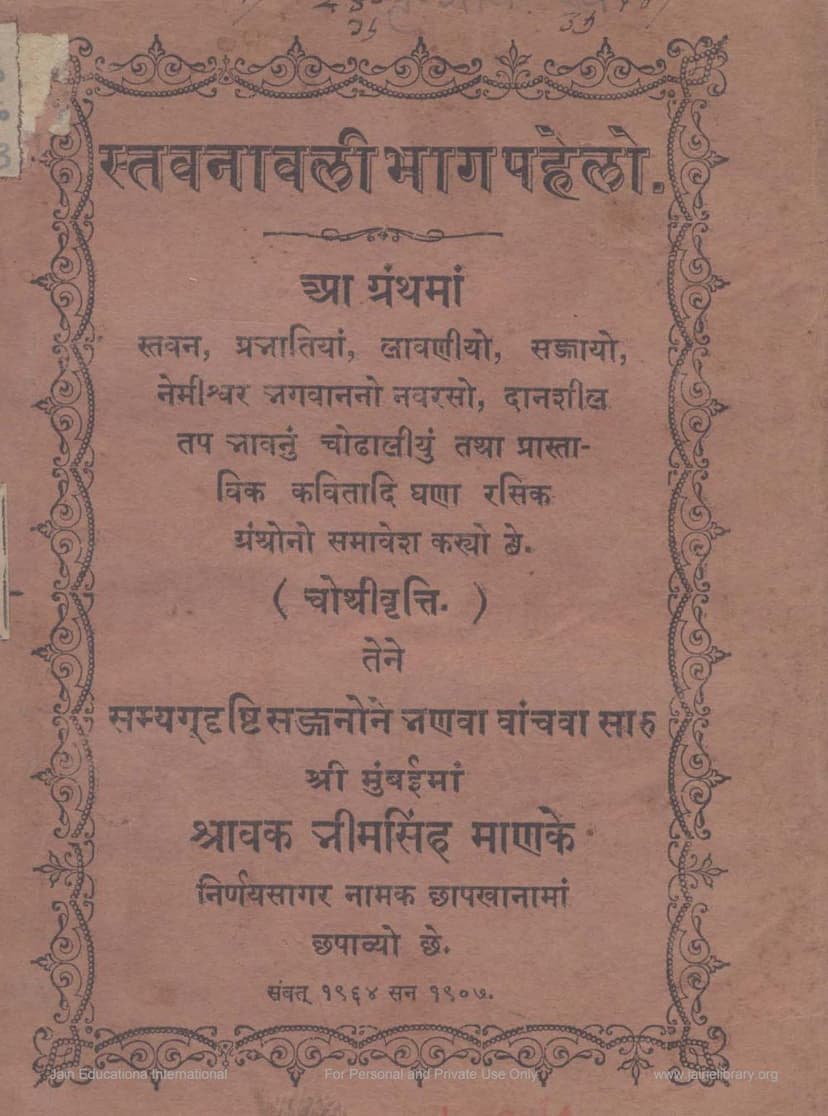Stavanavali
Added to library: September 2, 2025

Summary
The provided text is the index and a portion of the Jain devotional book "Stavanavali" (Book 1), compiled by Shravak Bhimsinh Manek. The catalog link provided directs to the Jain Educational International platform, where this book is available for personal use.
Here's a comprehensive summary based on the provided pages:
Book Title: Stavanavali (Part 1) Author: Shravak Bhimsinh Manek Publisher: Shravak Bhimsinh Manek Edition: Fourth Edition Publication Year: Samvat 1964 (1907 AD) Location of Publication: Nirnaysagar Press, Mumbai
Content Overview:
The book "Stavanavali" (Part 1) is a collection of devotional songs (Stavans), songs of praise, folk songs (Lavniyo), riddles (Saskayo), a poetic description of Lord Neminath's "Navraso" (nine sentiments), a "Chodheliyu" (a type of devotional poetry) on charity, chastity, and penance, and other poetic compositions. The preface highlights that the book is intended for the edification and enjoyment of spiritually inclined individuals (Samyagdarshini).
Structure and Key Sections:
The index (Anukramanika) meticulously lists 177 items, primarily devotional songs and poems dedicated to various Tirthankaras and Jain principles. The songs are categorized by their theme, type, or the Tirthankara they are dedicated to.
The book includes:
- Chaitra Vandans (Temple Visits/Salutations): Several entries are dedicated to saluting Tirthankaras like Adinath, Parshvanath, Shreyans Kumar, Simandhar Swami, Padmaprabhu, Vasupujya, and others.
- Stavans (Devotional Songs): The majority of the book comprises a vast collection of Stavans, expressing devotion, praise, longing, and philosophical insights related to Jainism. These Stavans are dedicated to various Tirthankaras, including Parshvanath (especially Shankheshwar Parshvanath), Adinath (Rishabhnath), Neminath, Mahavir Swami, and others.
- Songs on Festivals and Occasions: Specific Stavans are dedicated to Diwali, highlighting its significance in Jainism, particularly the Nirvana of Lord Mahavir.
- Philosophical and Ethical Teachings: Several songs touch upon core Jain principles such as:
- Anekantavada (Non-absolutism): Implied in discussions about different viewpoints.
- Ahimsa (Non-violence): A recurring theme, especially in the context of compassion and ethical living.
- Detachment and Renunciation: Songs urging the renunciation of worldly desires and attachments.
- Importance of Knowledge and Right Conduct: Emphasizing the path to liberation through true understanding and practice.
- Critique of Ignorance and Wrong Beliefs: Addressing various spiritual paths and highlighting the superiority of Jain Dharma.
- The Nature of the Soul and God: Exploring the self and the nature of the omniscient beings.
- Specific Poetic Forms: The index mentions "Lavniyo" (folk songs), "Saskayo" (riddles/enigmas), and "Chodheliyu" (a specific type of devotional poetry).
- Poetic Styles and Authors: Several entries attribute the songs to specific composers or poets within the Jain tradition, such as Shri Anandghanji, Shri Jinadas, Shri Chandravijay, Shri Jnanasar, Shri Harkhchand, Shri Surshashi (Devchand), and Shri Amrit. This suggests a rich tradition of devotional poetry within Jainism.
- The "Navraso" of Lord Neminath: A specific section is dedicated to exploring the nine sentiments as experienced in relation to Lord Neminath.
- "Chodheliyu" on Charity, Chastity, and Penance: This section likely delves into the importance and practice of these virtues in Jainism.
- Other Sections: The index also lists sections on "Paradhinata Vishes Doha" (Dohas on dependence), "Akal Vishes Doha tatha Aribandh" (Dohas on intellect and enemy/obstacle bindings), "Gun Vishes Doha" (Dohas on virtues), and "Streeno Gundosh Vishes Dohaadi" (Dohas on the merits and demerits of women). There are also specific sections on the "Saskay" of Elachi Kumar, Ratrijojan, Paryushan festival, Meghrath Raja, Kamakandarp, Vairagya, and "Shikhamon Kone Aapvi" (On whom to impart advice).
Overall Significance:
"Stavanavali" is a significant compilation of devotional literature within the Jain tradition. It showcases the rich poetic and musical heritage of Jainism, providing a means for spiritual upliftment, reflection, and connection with the Tirthankaras and their teachings. The book serves as a valuable resource for understanding Jain devotional practices and the philosophical underpinnings of the faith, expressed through the beautiful medium of poetry and song.